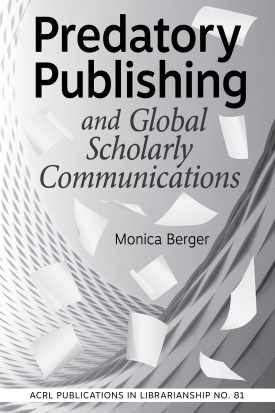Primary tabs
You don't need to be an ALA Member to purchase from the ALA Store, but you'll be asked to create an online account/profile during checkout to proceed. This Web Account is for both Members and non-Members. Note that your ALA Member discount will be applied at the final step of the checkout process.
If you are Tax-Exempt, please verify that your account is currently set up as exempt before placing your order, as our new fulfillment center will need current documentation. Learn how to verify here.
- Description
- Table of Contents
- About the author
Predatory publishing is a complex problem that harms a broad array of stakeholders and concerns across the scholarly communications system. It shines a light on the inadequacies of scholarly assessment and related rewards systems, contributes to the marginalization of scholarship from less developed countries, and negatively impacts the acceptance of open access.
To fix what is broken in scholarly communications, academic librarians must act as both teachers and advocates and partner with other stakeholders who have the agency to change how scholarship is produced, assessed, and rewarded. Predatory Publishing and Global Scholarly Communications is a unique and comprehensive exploration of predatory publishing in four parts.
- Background
- Characteristics and Research
- The Geopolitics of Scholarly Publishing
- Responses and Solutions
It examines the history of predatory publishing and basics of scholarly assessment; identifies types of research misconduct and unethical scholarly behaviors; provides critical context to predatory publishing and scholarly communications beyond the Global North; and offers structural and pedagogical solutions and teaching materials for librarians to use in their work with authors, students, faculty, and other stakeholders.
Predatory Publishing and Global Scholarly Communications gives powerful insight into predatory publishing across the world, inside and outside of the library community, and provides tools for understanding and teaching its impact and contributing to its improvement.
Acknowledgements
Foreword
Part 1. Background
Chapter 1. Introduction
The Philosopher and the Scientist
My Story
Definition
How Is Predatory Publishing Damaging?
The Fraught Language of “Predatory Publishing”
A Mutable, Wicked Problem
Book Overview
Notes
Chapter 2. Predatory Publishing’s History and Open Access
Section A: Early Awareness of Predatory Publishing and the Rise of Beall’s List
Section B: Open Access: A Brief History and Overview
Section C: Article Processing Charges (APCs)
Notes
Chapter 3. Shortcuts and Shortcomings: Neoliberalism and Its Effects
Section A: Neoliberalism and the Commons
Section B: Scholarly Evaluation
Section C: Overview of Research Misconduct and Unethical Scholarship
Notes
Part 2. Characteristics and Research
Chapter 4. Predatory Publishing Characteristics in Detail
Section A: OMICS Case Study
Section B: Detailed Characteristics of Predatory Journals
Section C: Books and Conferences
Section D: Hijacked Journals
Conclusional Caveats
Notes
Chapter 5. The Research on Publishers and Authors
Challenges and Lacunae in the Research
Section A: Research on Predatory Publishers and Journals
Section B: Research on Authors
Notes
Chapter 6. The Research on Editors, Evaluators, Spam, Indexing, Citation, and Bibliometrics
Section A: Research on Editors
Section B: Institutional Evaluation and External Funders
Section C: Spam Messages and Rhetorical Style
Section D: Indexing, Citation Rates, and Bibliometrics
Notes
Part 3. The Geopolitics of Scholarly Publishing
Chapter 7. The Global South, the Bohannon Sting, and Predatory Publishing
Section A: Introduction to the Global South and Epistemic Injustice
Section B: English as the Lingua Franca of Academic Publishing
Section C: The Bohannon Sting
Section D: Predatory Publishing and the Global South
Notes
Chapter 8. India, Sub-Saharan Africa, and China
Section A: India
Section B: Sub-Saharan Africa
Section C: China
Conclusion
Notes
Chapter 9. Other Countries, the Geopolitics of Predatory Publishing, and Solutions from the South
Section A: Other Countries
Section B: The Politics of the Global South and Predatory Publishing
Section C: Solutions to Predatory Publishing in the South
Notes
Part 4. Responses and Solutions
Chapter 10. Responses and Solutions to Predatory Publishing from the Scholarly Community
Introduction
Section A: More about Journal Lists
Section B: Guidelines from Publisher- and Editor-Focused Organizations
Section C: Open Peer Review (OPR) and Open Science
Section D: Other Solutions
Notes
Chapter 11. Librarians and Pedagogical Solutions to Predatory Publishing: Scholarly Information Literacy and Publication Quality
Section A: Scholarly Information Literacy and Publication Quality
Section B: Self-Teaching Tools
Section C: Dispelling Misconceptions and Opening Conversations
Notes
Chapter 12. Librarians and Pedagogical Solutions to Predatory Publishing: Teaching Scholars from Undergraduates to Faculty
Section A: Language and Models
Section B: Intersections: Teaching Undergraduates
Section C: Graduate Students: The Scholars of Tomorrow and Today
Section D: Workshops for Faculty
Section E: Consultations
Conclusion
Appendix: Additional Resources
Notes
List of Abbreviations
Index
About the Author
Monica Berger
Monica Berger, Instruction and Scholarly Communications Librarian and Professor, Library, New York City College of Technology, City University of New York, has published and presented on topics related to scholarly publishing including predatory publishing, bibliodiversity, and open access. At her campus, she supports faculty scholarship by teaching workshops as well as providing consultations. An ardent proponent of open access, she also manages her campus institutional repository, CUNY Academic Works.



